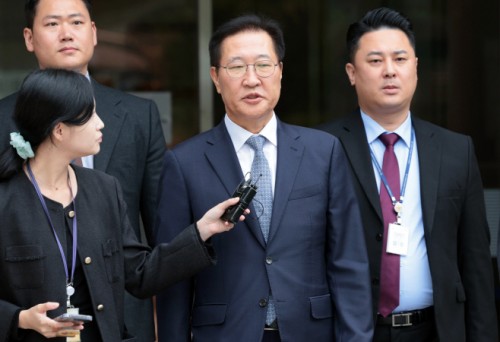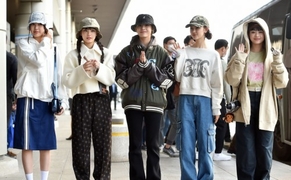 |
| Former Justice Minister Park Sung-jae leaves the Seoul Central District Court in Seocho District on October 14 after attending a warrant hearing on charges of aiding and abetting former President Yoon Suk Yeol’s December 3 martial law declaration. / Source: Yonhap News |
A Seoul court on Wednesday dismissed prosecutors’ request to arrest former Justice Minister Park Sung-jae on charges of aiding and abetting the December 3 martial law declaration by former President Yoon Suk Yeol, ruling that the allegations were insufficiently substantiated.
Judge Park Jung-ho of the Seoul Central District Court, who handles warrant reviews, said there was “insufficient evidence to justify detention or to establish a risk of flight or destruction of evidence,” rejecting the special prosecutor’s motion.
“There is room for dispute over how and to what extent Park recognized the illegality of the situation and whether his actions were unlawful,” the judge said. “Given the current level of evidence, the progress of the investigation, and Park’s cooperation so far, the principle of non-detention during investigation should take precedence over concerns about obstruction or flight.”
The decision deals a setback to the special counsel team investigating the alleged insurrection plot, which had sought Park’s detention for further questioning.
During Tuesday’s warrant hearing, Special Prosecutor Lee Yoon-je and prosecutors Cha Jung-hyun and Song Young-sun, along with military prosecutors Shin Dong-jin and Ki Ji-woo, presented a 230-page opinion and a 120-slide presentation asserting that Park’s cellphone had been replaced and some data deleted, and that certain documents from the Justice Ministry’s Correctional Bureau were destroyed — evidence they said pointed to a risk of tampering.
Park, however, denied all allegations, arguing that he merely performed his duties as justice minister and did not view the martial law declaration as an act of rebellion.
On December 3, 2023, Park was reportedly one of the first officials briefed by then-President Yoon about his plan to declare martial law. He attended both the Cabinet meeting that approved the declaration and the subsequent meeting that revoked it the following day.
The special counsel argued that Park bore greater responsibility than other Cabinet members because, as justice minister, he was legally bound to safeguard human rights and uphold the rule of law under the Government Organization Act.
Investigators also suspect Park of directing senior ministry officials to prepare for a joint investigative task force, ordering the immigration bureau to ready an exit-ban team, and instructing the correctional bureau to secure detention space — actions prosecutors believe indicate complicity in the martial law plan.
Park has consistently maintained that he opposed Yoon’s decision during the Cabinet discussions but was unable to stop it due to the president’s insistence.
Most Read
-
1
-
2
-
3
-
4
-
5
-
6
-
7





















